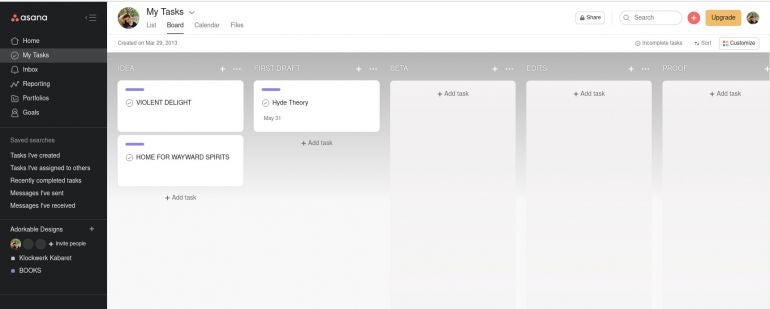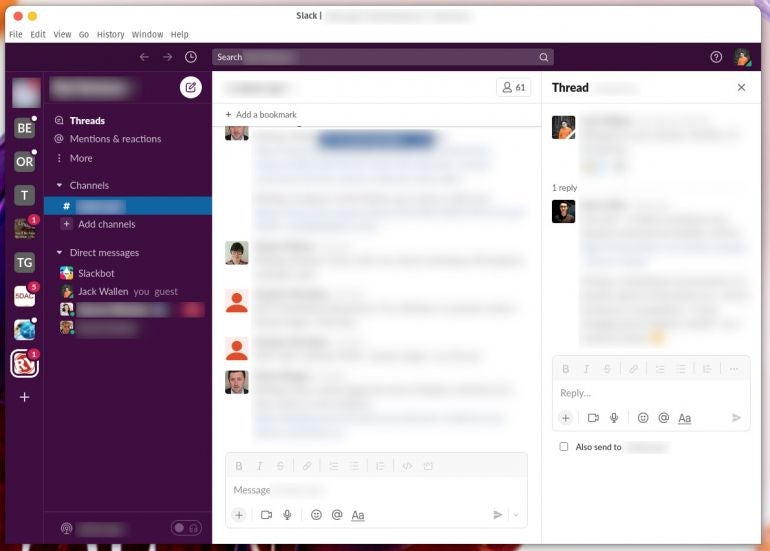
Once upon a time, project management and workflow could be easily managed with a spreadsheet and Rolodex. But as the competition and complexity of doing business continue to increase exponentially, you need tools capable of keeping your company in line with the growing demands.
Although Asana and Slack are two very different products, you and your company might be considering one or the other to help make your workflow more efficient and collaborative. In the end, you might wind up employing both tools. However, you should first understand the purpose of Asana and Slack before you make that decision.
SEE: Hiring kit: Project manager (TechRepublic Premium)
What is Asana?
Asana is a platform to help your teams stay organized and connected. With Asana, your teams are empowered to collaborate on projects of all sizes. With the help of lists, timelines, boards , automation, rules, forms, templates, approvals, calendars, tasks, portfolios, goals and a massive number of third-party integrations, there’s little that can’t be done with the program (Figure A).
Figure A

What is Slack?
Slack is one of the most popular communication and collaboration tools on the market (Figure B). With the ability to create different workspaces and channels, you can fine-tune who communicates and collaborates with whom, all the while ensuring every team member in your company is empowered to work together as efficiently as possible.
Figure B

Asana vs. Slack: Feature comparison
| Asana | Slack |
|---|---|
| Project and workflow management | Workspace communication |
| Multiple workspaces each with its own kanban boards, Timelines, Calendars, and Files | Workspaces, channels, threads, direct messages |
| Plenty of third-party integrations with no code required | Third-party integrations with little to no coding required |
| Includes integration with Slack | Can be integrated with Asana via an app |
| Efficient workflow management | Efficient communication |
| Real-time reporting | Slash commands and asynchronous communication |
| Plans ranging from free to $24.99/month per user | Plans ranging from free to $12.50/month per user |
Asana vs. Slack: Head-to-head comparison
Workflow
If your company is into customizing workflows, Asana makes it easy to create workflows that perfectly align with the needs of your teams. With Asana, every team member can work with a calendar, a list or a kanban board to keep track of their work. And for team managers, Asana offers real-time progress resorts across projects, teams and departments.
Some might even say Asana tries too hard to be too much, while others would argue that it’s just the perfect conglomeration of features. But given Asana’s primary focus is on improving workflows, you can bet it’s going to include every feature necessary to help your company improve how your teams work individually and together.
The Workflow Builder might be of considerable importance to teams, especially those in an Enterprise environment. With this feature, you use a visual tool to connect teams, organize works, and streamline project management into one place. You can systemize intake, automate tasks, integrate third-party tools, improve processes, and templatize your workflows.
As for Slack, the workflow is far less constrained and is more focused on free-flow communication between individual users and teams. The only workflow structure you’ll find is the ability to create Workspaces and Channels.
Project management
For most teams, the features that will get the most attention are the Timelines (think Gantt charts), Boards (kanban), and Calendars, as those are where the bulk of project management is done. However, if your function is more of the managerial sort, the new Workflow Builder, App Integrations, and Reporting tools might garner more of your attention.
Slack doesn’t really offer much in the way of project management, other than making it very easy for teams to not just communicate but collaborate on any given project at hand. However, if you think your company can use Slack as a project management solution, think again. Slack doesn’t include any of the standard project management features such as kanban, Gantt or sprints.
Collaboration and communication
Slack is, at its heart, a communication tool. With the ability to create multiple Workspaces and Channels that can make communication within large businesses much easier, Slack can pretty much cover any sector — from retail, manufacturing, development, government, education and everything in between. Slack does a great job of empowering collaboration between teammates, teams and departments.
Teammates can communicate and collaborate via discussion, threads and direct messages, so there’ll be no shortage of spaces in which your staff can chat. And given how much of the world is still managing the work-from-home model, Slack has become a crucial tool to help keep the lines of communication and collaboration open.
Other important features of Slack include slash commands so users can run commands such as /remind me Team Call in 10 minutes. By employing these commands, users can elevate Slack beyond just a communication and collaboration tool and into the realm of a personal digital assistant.
Asana, on the other hand, limits communication to comments within Tasks. This is a very important feature, as it allows teams to comment on various tasks and projects. But as far as a full-blown communication tool, Asana doesn’t come close to what Slack has to offer.
Choosing between Asana and Slack
You might be tempted to use Asana or Slack to help your teams reach a higher level of efficiency, but if you’re serious about taking workflows and collaboration to the next level, you might want to consider employing both platforms for your business. With the combination of Asana’s powerful workflow tools and Slack’s communication and collaboration features, your teams would wind up being far more efficient at delivering the goods on time.
Subscribe to TechRepublic’s How To Make Tech Work on YouTube for all the latest tech advice for business pros from Jack Wallen.
Top project management software recommendations
1
monday.com
monday.com Work OS is the project management software that helps you and your team plan, execute, and track projects and workflows in one collaborative space. Manage everything from simple to complex projects more efficiently with the help of visual boards, 200+ ready-made templates, clever no-code automations, and easy integrations. In addition, custom dashboards simplify reporting, so you can evaluate your progress and make data-driven decisions.
2
Wrike
Tackle complex projects with Wrike’s award-winning project management software. Break projects into simple steps, assign tasks to team members, and visualize progress with Gantt charts, Kanban boards, and calendars. Manage resource allocation and forecasting with software that’s easy to launch. Automation and AI features strip away time-consuming admin tasks so you can do the best work of your life. Streamline your practices, align your team, and ensure you hit deadlines and stay on budget.
3
Rocketlane
Rocketlane is purpose-built to run customer facing projects. It uniquely ties project management, document collaboration, and communication to help teams hit their project goals, accelerate time-to-value, and elevate the customer experience.
4
GanttPRO
Powerful intuitive app to schedule projects in minutes! GanttPRO has all the key elements of classic Gantt charts and introduces indispensable features for project manager: advanced task management, progress tracking, resource and cost management, team collaboration, task time tracking, baselines, project export and sharing, and more.
5
LetsBuild
Construction software for project managers and site managers. LetsBuild’s cloud-based apps support planning, progress reporting, snagging, communication, and reporting, and information is updated in real-time, whether at the office on on-site.
Source link






Leave a Reply